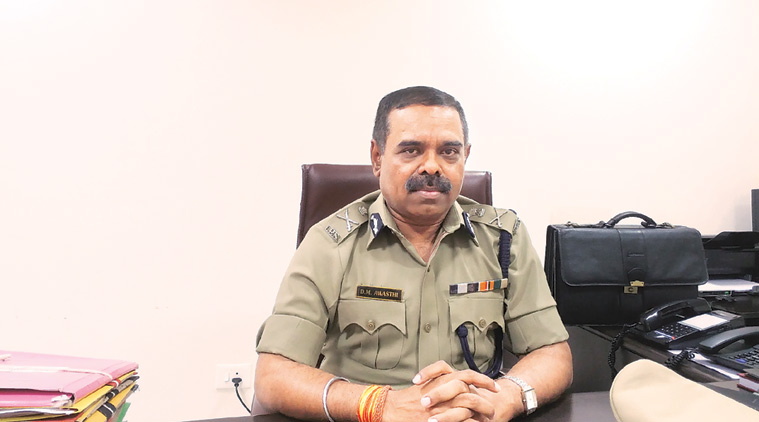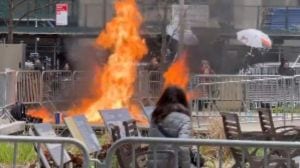- India
- International
To deal with a small team, send a small team: D M Awasthi
In conversation with Chhattisgarh’s new Special DG (Anti Naxal Operations).

How do you look at Naxalism, a military problem or a developmental problem?
From my angle, it is both because Naxals have guerrilla tactics, they have a military division. So one, it’s a military problem. But it generated because of lack of development and so many other things. Now our government, as well as the central government, both have a focus on development. And we have seen… I was in the police housing department, we worked in Naxal areas. We found that once the buildings start coming up, the roads come up, Naxals are going back into the jungles. Development is most important… but without security and without providing safe areas to the forces and the environment, development cannot go fast. Development doesn’t just mean roads, and hospital and buildings, but also skill development and the education of the tribals. The police, and the BSF and the CRPF and others are doing operations to create a safe atmosphere. If we create that atmosphere, people are also joining in the developmental work. There is a lot of change, a shift, I have seen in the past fifteen years.
There has been talk of attack teams going in becoming smaller. In terms of operations, are there any changes you have thought about?
There are two strategies. One, you go and dominate the area. You are travelling, creating a sense of security in the public and coming back to the camps. The other thing, side by side, is pinpoint information, intelligence-based operations. If you have intelligence, you can go there without wasting any energy. If you go in unknowingly, often there can be attacks on forces.

A few months ago, it was said that the Air Force would retaliate in case there was an attack on them. How do you see the role of the armed forces?
When we move into the jungles, there are also a large number of tribal people living there. You never know who is a Naxal, who is a non-Naxal. So we have to be very, very careful. If we go for air bombing and all those things, I think it’s not the correct strategy as of now… Though any force, anywhere, if it is fired upon, they have to retaliate.
So are you saying smaller teams of forces, based on information, will be sent into these areas. That is the tactic?
Tactically, we should not discuss too much. But one thing is important — this depends on the terrain and on the focus. If you have to deal with a small team, you send a small team. If you are dealing with a big force in a deep jungle, you have to send a big team. So it is an area-wise strategy, I can say.
Is there an achievable, possible time-frame to bring down Naxalism?
People have different opinions but to my mind, any insurgency, any terrorism has to be finished gradually. It cannot be said that ye koi building hai ki do saal mein ban hi jayegi. It depends on how successful you are in two ways — one is the government’s surrender policy…. the other thing is warfare — Time kitna lagega, I personally feel that we cannot tie it down to a time-frame. One year, two years, three years, as a professional man, I cannot say this.
The police have faced questions for saying 70 people of an area surrendered together. There have been doubts if they were really Naxals.
My commenting on previous incidents is not very correct but as an individual… if 70 or 100 people surrender, it always creates suspicion. If it is true, then it is a very very good thing. But once news comes that 70 people have surrendered, I personally feel that suspicion is always generated…. In the future, if there is a surrender or an operation, I will look into that and come back to you. I have told them that it is good that people are surrendering but I don’t believe in the number game or anything statistical.
There have been three recent instances of women alleging mass sexual exploitation. There has been hesitation in registering FIRs in at least two of those cases…
Any police, all forces are accountable, we are not above the law. If at all it is true or not true, you have to register a case and then decide, or at least a complaint must be registered and an inquiry done. So it creates confidence in the mind of people, ki aisa ghatna hua hai, to koi sun raha hai. Sometimes, these are tactics of Maoists to demoralise the force… But I personally feel no officer should do anything unlawful, like misbehaving with women…. I have clearly instructed everyone that please be very, very careful. We don’t hear of this about senior officers, but when forces go in, sometime juniors can do this. Forces should do professional work. Out of frustration, they should not misbehave with anyone. Whether it is a poor villager or a woman. It is totally uncalled for. In Naxal areas, where we are conducting operations, it can be won by goodwill and not bad will. If something like this comes up, an enquiry must be conducted and clear transparent work must be done. It is also correct that we don’t hear of this about senior officers, but when the forces go in, sometime juniors can do this. Shielding of these kinds of incidents will not be done.
There are several NGO’s that work in tribal areas. Some of them have repeatedly been called sympathisers by the police or district administrations. Similarly with journalists, there are two journalists in jail in cases. There is this sense in Bastar that they are oppressed against for reporting against atrocities. Should an environment like this exist?
I feel journalists are also very important for police or for forces. They are also well informed sometimes and give a lot of information. Some people who are doing other kinds of things are exceptional. But mostly people working as journalists are good and their views must be respected. Their views may be different, but unke baat sunke, retaliate karne ka faayda nahi hai. You have to listen to them. If they write wrong things, no problem. If they write something that is right, you have to take corrective measures. Regarding NGO’s, there are many NGO’s that work, and others that don’t. There is a view that Naxals also have an ideology and that some are supporters and others are not. Ideological support is a freedom of speech guaranteed by the Constitution. If somebody is expressing something, it doesn’t make a difference if it isn’t illegal. We will create an atmosphere where SP’s and the IG also listen to their views and understand them. Even if he is not an NGO, he must be listened to. It is a perception in the police, that this is a journalist and is no good, this is an NGO, so no good at all. This perception is false. Like people think, every policeman is bad. If you meet police officers, you will find many good police officers, like you will find many good people. We will have to change our lens. Community policing is very important because the police is created for community, for society.
There is generally a sense in Bastar that much of the ire against the police seems to be personal against that IGP (Bastar) S R P Kalluri; a lot has been said about methods he uses. What is your view?
See, I have only had a week as Special DG but I know him and the area also. State police as well as CRPF, BSF, they like this IG as their commander. And I know Kalluri, he is an emotional person. He is very very active and hardworking and a courageous man. The second — this is the personal part and how he is dealing with people — why people are saying this and why there is this perception has to be changed. Maybe it is a propagated thing to demoralise Kalluri; if it is, I will look into it.
When you were appointed, Chief Minister Raman Singh used the words “better coordination”. Do you see lack of cohesion as a failing to correct?
Again this is a question of perception. I cannot comment if it was not there because I was not in the PHQ for five years. But I feel the forces must be united. From my end, coordination will never be a problem. We have to have one ideology, and that is to be professional. We have to have teamwork and not just in fieldwork but also in PHQ. We will resolve all issues. When the challenge is this big, then coordination is very important. I will do my best and with all my ability.
Finally, what are your priorities?
My priority is lead the forces, to create a sense of better coordination, to motivate them and, most importantly, to create a sense of credibility about the forces among the public. That the police are for them. Credibility of police is my first priority.
Apr 19: Latest News
- 01
- 02
- 03
- 04
- 05






































